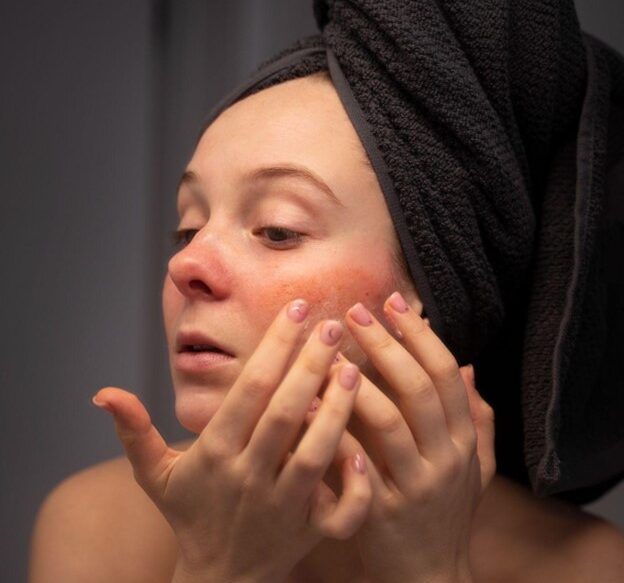Last updated on April 10th, 2025 at 12:30 pm

If you’ve been blessed with sensitive skin, you know that while it may not come with a manual, it certainly comes with its challenges. From unpredictable breakouts to irritation from the gentlest of products, sensitive skin requires special attention and a curated routine with sensitive skin products.
Sensitive skin can show up in different ways for different people. For some, it means dealing with redness and itching, while others might experience dryness, burning, or unexpected breakouts. It is a skin type that is easily affected by things like weather changes or certain skincare products. The secret to managing sensitive skin is figuring out what sets it off and building a gentle skincare routine that keeps your skin calm and protected.

Sunscreen for Sensitive Skin
In India, where the sun shines bright almost all year, sunscreen is a must—especially if you have sensitive skin type. Many people with sensitive skin find that chemical sunscreens can cause irritation, so it’s better to go for mineral-based sunscreens with ingredients like zinc oxide or titanium dioxide. These are gentler and still give excellent protection. Always choose formulas that are fragrance-free and hypoallergenic to avoid flare-ups. Brands like La Roche-Posay and Neutrogena have great options tailored for sensitive skin. Don’t forget to wear sunscreen daily, even on cloudy days, and reapply every two hours if you’re outside. This simple step can protect you from sunburn, pigmentation, and keep your sensitive skin calm and healthy.
Face Wash for Sensitive Skin
Choosing the right face wash for sensitive skin is especially important in India’s varied climate. Many cleansers can strip away your skin’s natural oils, leaving it dry and irritated. To avoid this, opt for gentle, sulfate-free face washes that clean without being harsh. Ingredients like chamomile or aloe vera are great for soothing sensitive skin. Brands like Cetaphil and Himalaya Herbals offer mild yet effective options. If you’re in a humid area, gel-based cleansers can help manage oil without drying you out, while cream-based ones are better for drier regions. Always go for pH-balanced, fragrance-free products to avoid irritation, and use lukewarm water to wash your face twice a day for a calm, healthy glow.
Moisturizer for Sensitive Skin
If you have sensitive skin, finding the right moisturizer is key to keeping your skin hydrated and calm. Look for lightweight, non-comedogenic options that won’t clog pores. Ingredients like hyaluronic acid, glycerin, and ceramides are your skin’s best friends, as they hydrate and strengthen your skin’s barrier. Brands like Clinique and Neutrogena offer moisturizers tailored for sensitive skin. In India’s humid climate, gel-based moisturizers feel light and refreshing, while cream-based ones work better for drier areas. Always go for fragrance-free formulas to reduce the risk of irritation. Moisturizing regularly will soothe your skin, ease redness, and help you maintain a healthy, balanced glow.

Building a Sensitive Skin Care Routine
Creating a sensitive skin care routine is all about selecting gentle, non-irritating products and ensuring that your skin is protected from potential irritants.
1. Cleansing Gently
Finding the right face wash for sensitive skin can feel like a challenge. You want a cleanser that removes dirt and oil but doesn’t strip your skin of its natural moisture. One great option is Cetaphil Oily Skin Cleanser. While it’s made for oily skin, it’s gentle enough for sensitive skin too, helping to control excess oil without causing irritation. It’s ideal if your skin tends to be both sensitive and oily. When washing your face, stick to lukewarm water—hot water can aggravate sensitivity. After cleansing, gently pat your skin dry instead of rubbing to keep irritation at bay.
2. Moisturize to Maintain Your Barrier
After cleansing, it’s super important to lock in moisture with a gentle moisturizer that’s made for sensitive skin. Look for one that has ingredients like ceramides, hyaluronic acid, or glycerin—these help keep your skin barrier strong, locking in hydration and keeping irritants out. Sensitive skin can sometimes be tricky, feeling oily one minute and dry the next, so aim for a light, non-comedogenic formula that won’t clog your pores. Products like Vani cream or La Roche-Posay’s Toleriane Double Repair Moisturizer are great choices because they hydrate deeply without triggering breakouts, keeping your skin calm and balanced.
3. Sun Protection is Non-Negotiable
The sun can be a major culprit when it comes to irritating sensitive skin. That’s why wearing sunscreen daily, no matter the weather, is so important. If you have sensitive skin, it’s best to stick to mineral sunscreens with ingredients like zinc oxide or titanium dioxide—they’re much gentler than chemical ones. Brands like EltaMD and Blue Lizard make sunscreens specifically for sensitive skin, offering broad protection without clogging your pores or causing flare-ups. Consistent use of sunscreen not only helps keep redness and irritation in check but also protects your skin from long-term damage.
4. Simplify Your Routine
When it comes to sensitive skin, keeping things simple is key. Using too many products can actually do more harm than good, leading to irritation. Stick to a few reliable products that work for your skin’s specific needs. A basic routine of gentle cleansing, moisturizing, and applying sunscreen is often all you really need. If you want to try something extra, like a serum, always test it on a small patch of skin first to make sure it doesn’t cause any irritation. Less really is more when caring for sensitive skin!
Choosing the Right Sensitive Skin Products
When it comes to sensitive skin, not all products are a good fit. It’s important to be selective and check labels for soothing ingredients like aloe vera, chamomile, or colloidal oatmeal, which help calm irritation. Steer clear of harsh additives like alcohol, synthetic fragrances, sulfates, and parabens, as these can make sensitivity worse.
The best skin care products for sensitive skin are often labeled hypoallergenic or non-comedogenic, meaning they’re less likely to cause breakouts or allergic reactions. Trusted brands like Cetaphil, La Roche-Posay, and Aveeno are frequently recommended by dermatologists because they’re specially designed for sensitive skin and can help keep irritation at bay.
Crafting the Perfect Night Routine
Your evening skincare routine for sensitive skin should focus on soothing and restoring balance. After a full day of exposure to pollution, makeup, and the sun, gently cleanse your skin to remove impurities without causing irritation. If your skin needs extra care, apply a calming serum to help soothe any redness or discomfort. Follow this up with a rich, nourishing moisturizer to lock in moisture and let your skin repair overnight.
For extra-sensitive skin, try incorporating niacinamide—a powerful anti-inflammatory ingredient that helps calm irritation and strengthen the skin’s protective barrier. Don’t forget to extend the same care to your neck and décolletage, as these areas are just as sensitive and often overlooked!
Conclusion
Caring for sensitive skin can feel like a bit of a challenge, but with the right routine and products, you can keep your skin calm, hydrated, and glowing. It’s essential to pay attention to how your skin reacts to new products—always patch-test first! Tune in to your skin’s needs, as it will often guide you toward what works best. If you’re ever in doubt or need personalized advice, don’t hesitate to consult a dermatologist. By being gentle and mindful of what your skin encounters daily, you’ll help ensure that your sensitive skin stays happy and healthy for years to come. Remember, you’re not alone on this journey; your skin deserves all the love and care!
FAQs On Caring For Sensitive Skin
1. How can I tell if I have sensitive skin?
Sensitive skin often reacts to skincare products or environmental factors, causing redness, itching, or irritation. You may notice flare-ups after using certain cosmetics or when exposed to harsh weather conditions. A dermatologist can help confirm if you have sensitive skin and suggest a suitable care routine.
2. What ingredients should I avoid in sensitive skin products?
For sensitive skin, avoid ingredients like alcohol, synthetic fragrances, sulfates, and parabens, as they can trigger irritation. Look for hypoallergenic, fragrance-free products, and favor soothing ingredients like aloe vera and chamomile. Always patch-test new products before full use.
3. Is sunscreen safe for sensitive skin?
Yes, but it’s essential to choose the right type. Mineral-based sunscreens with zinc oxide or titanium dioxide are gentler and less likely to cause reactions. Avoid chemical sunscreens that can irritate sensitive skin, and opt for fragrance-free, hypoallergenic formulas.
4. How often should I moisturize sensitive skin?
Moisturizing sensitive skin twice a day—morning and night—is ideal. Use a gentle, non-comedogenic moisturizer to help maintain the skin barrier and keep your skin hydrated. Applying after cleansing helps lock in moisture and prevents dryness or irritation.
Related Links :
